Homemade Chicken Coop Deodorizer
Chickens are fun, their eggs are delicous, and their coop can be smelly. Today we will see how to make a Homemade Chicken Coop Deodorizer that you can use to keep your coop smelling fresh and clean.
Raising chickens in your backyard is a great way to fill your kitchen with farm-fresh eggs daily.
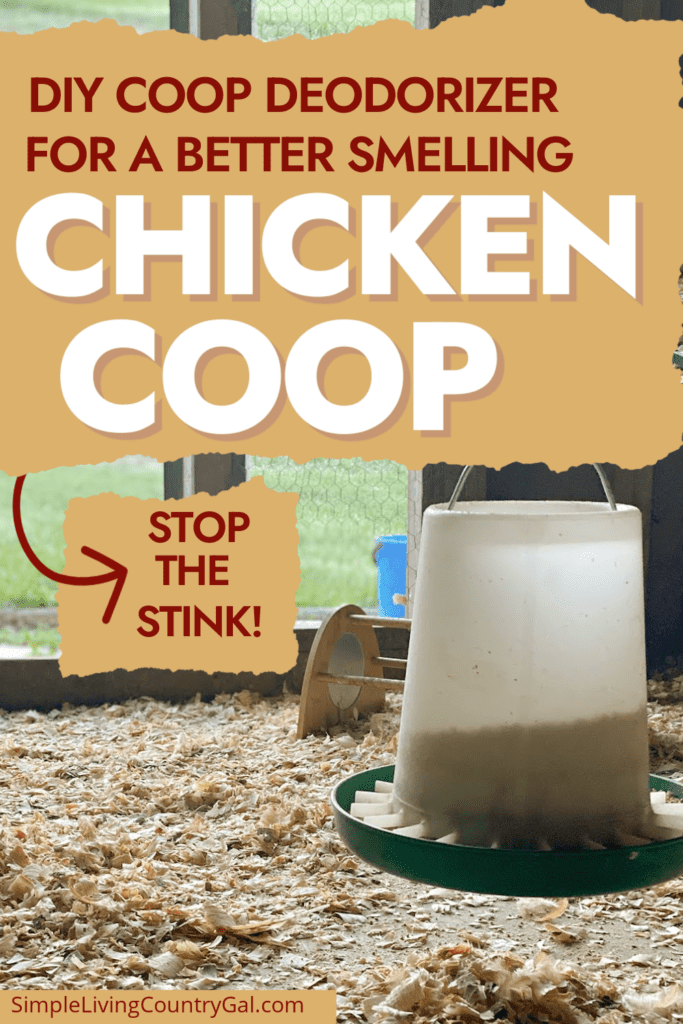
Raising chickens comes with a bit of work. Things such as their care, cleaning of their coop, their safety, and their health.
One of these tasks will help with all the others, and that is keeping a clean chicken coop. The more you can keep their home clean the cleaner the eggs, the fresher the air, and the healthier the bird.
But sometimes you need to do more than clean. You need to deal with the smell because that smell can do a number on your chicken’s health too.
Sure, you can purchase a deodorizer, but why not make your own? It’s less expensive and contains natural ingredients that you know will be completely safe for your chickens.
If you’ve been raising chickens for a bit, you’re probably very familiar with the ammonia smell that comes from the coop. It can be overpowering at times.
That odor doesn’t just smell bad; it can cause health concerns for your hens and even reduce egg production. That’s why it’s so important to keep the coop clean and smelling fresh.
Chicken Coop Odor
You’re probably familiar with the ammonia smell coming out of your chicken coop, but where is it coming from?
Ammonia is a gas that comes from uric acid that is present in the decomposing manure from your hens. It’s the bird equivalent of urine. When it gets wet or warm, it releases ammonia gas, causing a rancid smell.
Why is the amonia smell from the coop a problem for chickens?
This gas can be highly irritating to the mucous membranes in their eyes and in the respiratory system. It can reduce their immune system and put them at higher risk of infection, especially a respiratory infection, that they can then pass on to other hens.
If the ammonia gas gets in their eyes, it can cause redness and swelling, known as Conjunctivitis. Long exposure to ammonia gases can cause weight loss and less egg production.
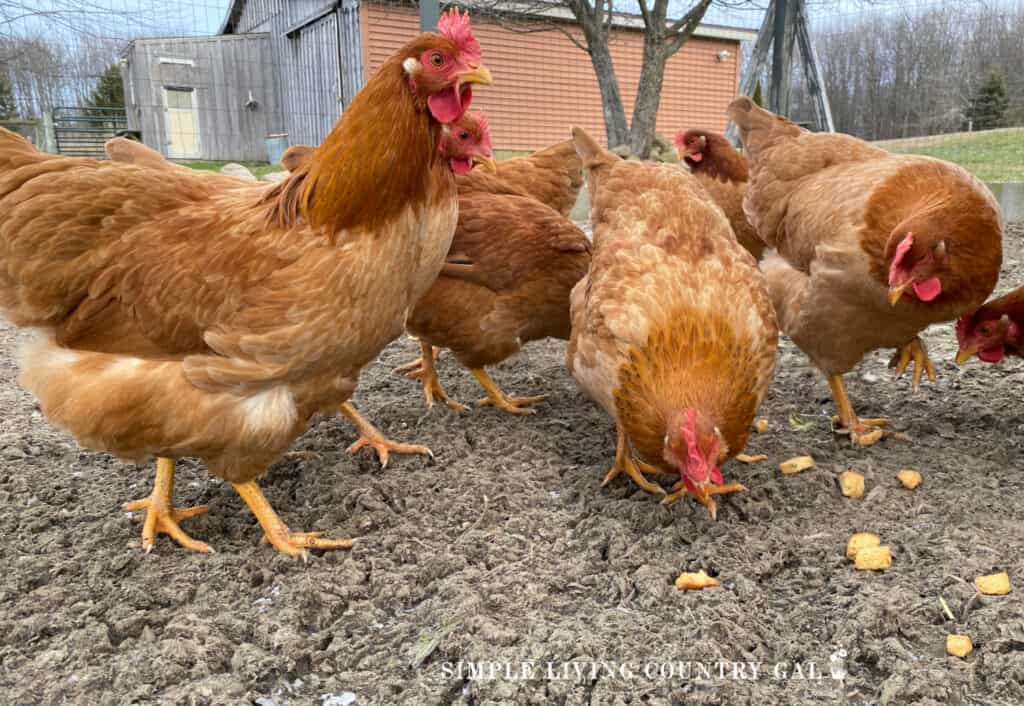
But here’s the most important part . . . humans don’t smell the ammonia until it’s a severe issue. By the time you are able to smell it, your hens are already suffering the damage.
Human noses smell ammonia at about 20 parts per million, so there has to be a lot of it before we start to smell it. And you’re standing several feet taller than your hens, meaning the smell takes longer to reach you. By the time you smell it, your hens have been only a few inches from it in their litter for some time.
Is your chicken sick? Check these signs of a sick chicken to find out!
To better detect it, you might want to get down on your hands and knees and smell a little closer to the ground. The closer you are to the source, the better you’ll be able to smell it.
The best way to eliminate it and keep it from becoming a severe issue is to keep the bedding as dry as possible, change it frequently, and use a chicken coop deodorizer.
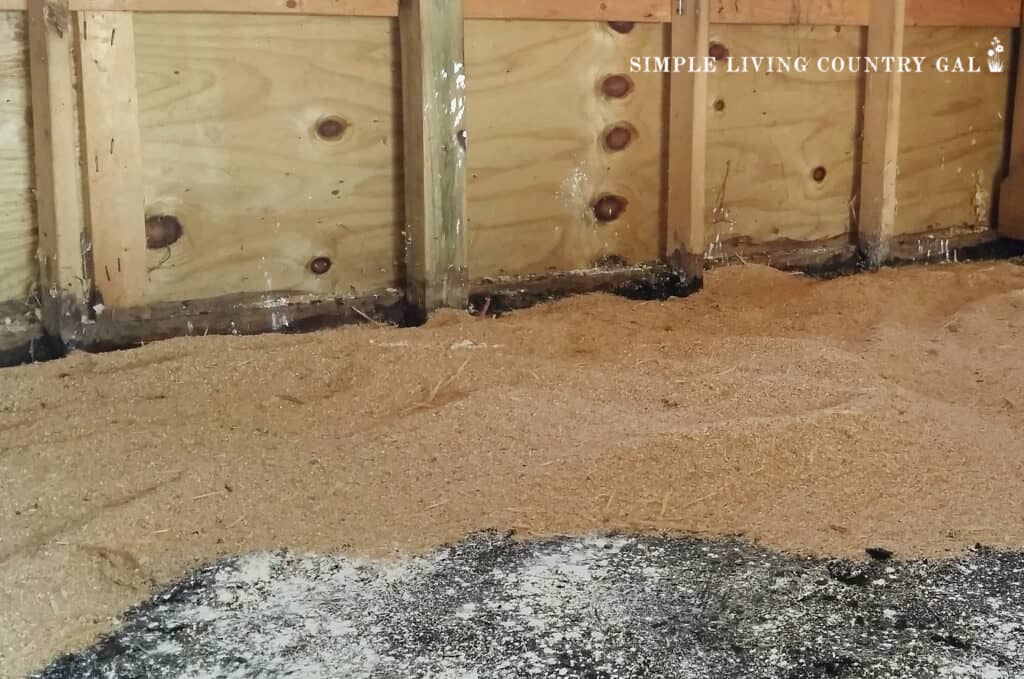
PDZ Refresher
PDZ is a mineral known as zeolite, and it can be mined or made synthetically. There are a couple of hundred types of zeolite, but zeolite clinoptilolite (ZC) is the one you want for your chickens.
Zeolite has a high absorption rate when it comes to ammonia; it contains molecules that adhere and neutralize excess nitrogen in uric acid, keeping ammonia from being generated, to begin with.
When mixed with used bedding from your chicken coop, PDZ can also act as a slow-release fertilizer for your garden, adding nitrogen and potassium to the plant roots without burning them.
While PDZ is not harmful or toxic to humans, do be careful when working with it and try to avoid breathing in the dust. Like any kind of fine particle, it can irritate your throat and lungs.
PDZ Coop Refresher can be purchased, but the cost can add up.
Making your own will not only save you money and help fertilize your garden inexpensively, but you can add additional ingredients that will also help reduce lice and mites.
PDZ can be purchased online, but it’s usually more expensive and because it’s so heavy, there are added shipping fees. If you can, you’re better off shopping at your local feed store for it.
Ingredients for Homemade Chicken Coop Deodorizer
Since you’re making it yourself, you can add a few extra ingredients to make it more beneficial. These are a few ingredients to consider adding to PDZ:
· Bentonite clay to help absorb moisture, keep things dry and provide an extra mineral boost.
· Diatomaceous earth to help keep parasites away.
· Barn lime for grit and calcium for the hens.
On average, making your own chicken coop deodorizer is 60% cheaper than buying it and more beneficial for the hens.
Homemade Chicken Coop Deodorizer
Supplies:
· 10 lb. bag Organic Food-Grade Diatomaceous Earth
· 5 lb. bag Bentonite Clay
· 25 lb. bag PDZ (purchase at local feed store instead of online to save money)
· 50 lb. bag Barn Lime (again, purchase at local feed store, shipping costs are high)
· 2 5-gallon buckets with snap lids (find at Home Depot or Lowe’s)
· 1 scoop
How-To:
1. Fill each bucket about halfway with PDZ.
2. Add Diatomaceous Earth to fill the buckets about 3/4 of the way.
3. Add 2 cups of Bentonite Clay to each bucket (a total of 4 cups).
4. Use the scoop to mix the powders in each bucket.
5. Slowly add Barn Lime, mixing as you go, until each bucket is full. Mix gently because the barn lime is heavier than the other ingredients, you don’t want it sinking to the bottom.
You now have 2 5-gallon buckets of homemade chicken coop refresher! Once a day, sprinkle it all over the chicken coop, especially under the roosting area. Keep the buckets sealed with the snapping lids.
When you clean out the coop, you’ll have a nice, natural fertilizer to add to your garden.
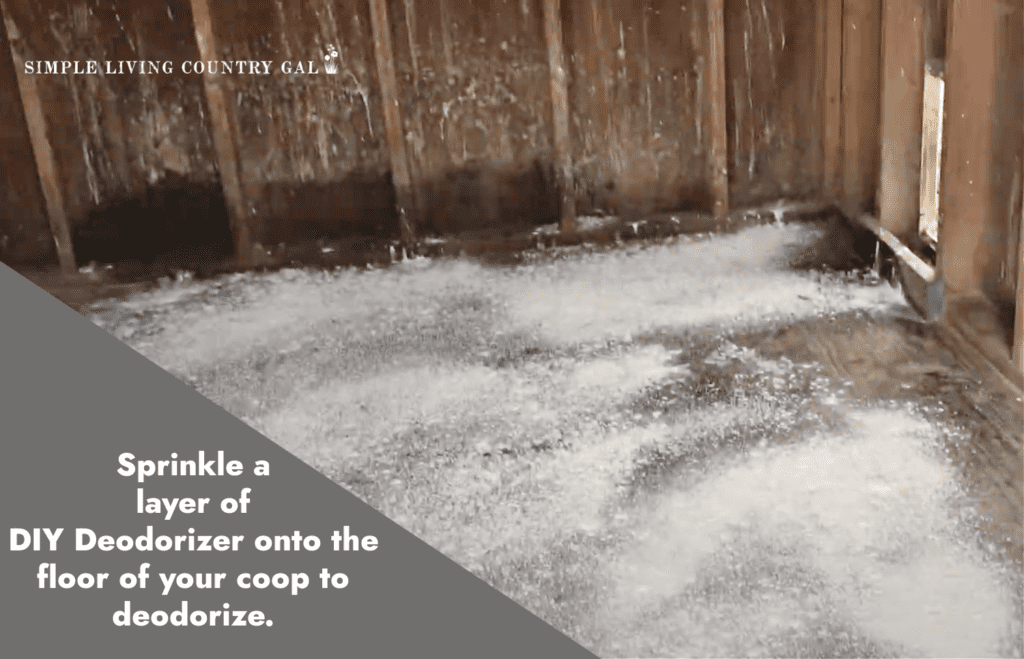
Using your own homemade chicken coop deodorizer daily when raising chickens will help to keep your chickens healthy and the coop from smelling of ammonia.
It’s easy to make, you can make two large buckets at one time, and it will save you hundreds over buying a ready-made mix at the store.
As an additional bonus, it provides more health benefits for your chickens and an excellent fertilizer for your garden. It’s a win-win situation for both you and your chickens!
More Chicken Coop Resources:
Chicken Coop Deodorizer
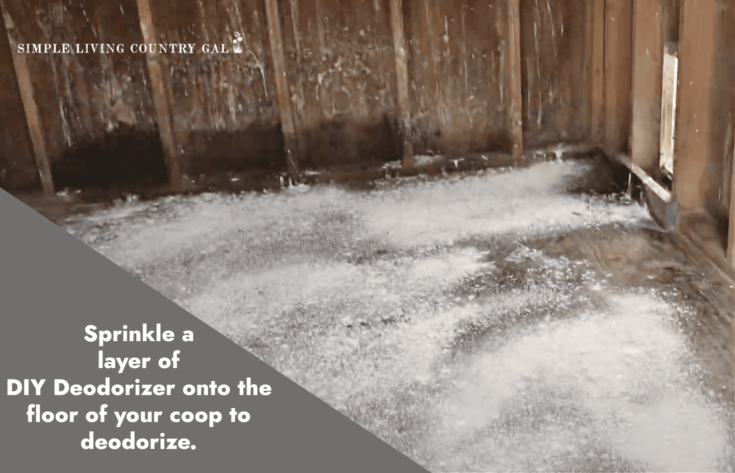
Having a chicken coop deodorizer that is natural will help to keep your coop clean and free of pests.
Ingredients
- · 10 lb. bag Organic Food-Grade Diatomaceous Earth
- · 5 lb. bag Bentonite Clay
- · 25 lb. bag PDZ (purchase at local feed store instead of online to save money)
- · 50 lb. bag Barn Lime (again, purchase at local feed store, shipping costs are high)
- · 2 5-gallon buckets with snap lids (find at Home Depot or Lowe’s)
- · 1 scoop
Instructions
- Fill each bucket about halfway with PDZ.
- Add Diatomaceous Earth to fill the buckets about 3/4 of the way.
- Add 2 cups of Bentonite Clay to each bucket (a total of 4 cups).
- Use the scoop to mix the powders in each bucket.
- Slowly add Barn Lime, mixing until each bucket is full. Mix gently because the barn lime is heavier than the other ingredients; you don’t want it sinking to the bottom.
Once a day, sprinkle it all over the chicken coop, especially under the roosting area. Keep the buckets sealed with the snapping lids.
Recommended Products
As an Amazon Associate and member of other affiliate programs, I earn from qualifying purchases.





where do you order bentonite clay form and what type?
You can order it from Amazon, the link is in the post. Just click it and you will see the product!
Tracy Lynn